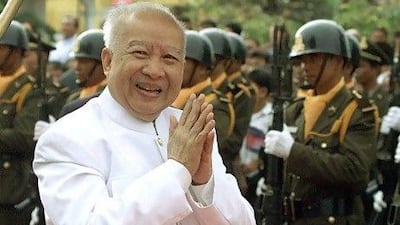PHNOM PENH // Norodom Sihanouk, the revered former king who was a towering figure in Cambodian politics through a half-century of war, genocide and upheaval, died today. He was 89.
Sihanouk abdicated the throne in 2004, citing his poor health. He had been getting medical treatment in China since January and had suffered a variety of illnesses, including colon cancer, diabetes and hypertension.
Prince Sisowath Thomico, a royal family member who also was Sihanouk's assistant, said the former king suffered a heart attack at a Beijing hospital.
Sihanouk's successor, Norodom Sihamoni, is expected to fly to Beijing to retrieve his father's body.
In January, Sihanouk requested that he be cremated in the Cambodian and Buddhist tradition, asking that his ashes be put in an urn, preferably made of gold, and placed in a stupa at the country's Royal Palace.
Sihanouk saw Cambodia transform from colony to kingdom, US-backed regime to Khmer Rouge killing field and foreign-occupied land to guerrilla war zone - and finally to a fragile experiment with democracy.
He was beloved by his people but was seldom able to deliver the stability they craved through decades of violence.
Born on Oct. 31, 1922, Sihanouk enjoyed a pampered childhood in French colonial Indochina.
In 1941, the French crowned 19-year-old Sihanouk rather than relatives closer in line to the throne, thinking the pudgy, giggling prince would be easy to control. They were the first of many to underestimate him, and by 1953 the French were out.
Sihanouk steered Cambodia toward uneasy neutrality at the height of the Cold War.
He was a ruthless politician, talented dilettante and tireless playboy, caught up in endless, almost childlike enthusiasms.
He made movies, painted, composed music, fielded a palace football team and led his own jazz band. His large appetite extended to fast cars, food and women. He married at least five times - some say six - and fathered 14 children.
After 1960, Sihanouk drifted toward the communist camp, seeking assurances from his powerful neighbours, China and Vietnam, that his country's neutrality would be respected.
By 1969, worried about increasing Vietnamese communist use of Cambodian soil, he made new overtures to the United States and turned against China.
Sihanouk's top priority was to keep Cambodia out of the war, but he could not. US aircraft bombed Vietnamese communist sanctuaries in Cambodia with increasing regularity.
In 1970, a US-backed coup sent the prince to Beijing for years of exile. Within weeks, war broke out, beginning a systematic destruction of Cambodia that killed millions and impoverished the survivors.
Sihanouk, seeking to regain the throne, joined the Khmer Rouge-dominated rebels after his overthrow. The alliance left Sihanouk open to subsequent criticism that he opened the way for the Khmer Rouge holocaust.
"The Khmer Rouge do not like me at all, and I know that," he said. "When they no longer need me, they will spit me out like a cherry pit."
When the Khmer Rouge seized power in 1975 and Sihanouk returned home, they detained him and ordered his execution. Only the personal intervention of Chinese leader Zhou Enlai saved him.
With Sihanouk under house arrest, the Khmer Rouge ran an ultraradical Maoist regime from 1975 to 1979. An estimated 1.7 million Cambodians were executed or died of disease and hunger under their rule.
Vietnam invaded Cambodia in December 1978 and toppled the Khmer Rouge a few weeks later. Freed as the Vietnamese advanced on Phnom Penh, Sihanouk found exile in Beijing and North Korea.
From there, he headed an unlikely coalition of three guerrilla groups fighting the Vietnamese-installed puppet government. The war lasted a decade.
Sihanouk headed the UN-supported interim structure that ran Cambodia until the 1993 elections.
The election was won by the royalist party of Sihanouk's son Prince Norodom Ranariddh.
But the bright promise of the elections soon faded. A violent coup shattered the results of the election, then a constitutional crisis.
During his last years, Sihanouk's profile and influence receded. While old people in the countryside still held him in reverence, the young generation regarded him as a figure of the past and one partly responsible for Cambodia's tragedy.

